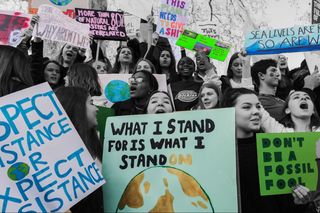
What Environmental Populism Is, and How It Could Save the Planet
Activists like Greta Thunberg are reclaiming a political philosophy most recently associated with right-wing xenophobia.

Populism is sweeping the world; from the U.S. to India to Europe, the moment is rife with movements complaining the common man has been left behind by political, corporate, technological, and academic elite.
These movements may or may not see themselves as populist; populism tends to be labeled from the outside, as the irony is, these movements — designed to unite and protect the common people — are generally hotbeds of divisiveness as thinner and thinner lines are drawn to define who, exactly, are the common people worth protecting. As such, populism has often been led by authoritarian demagogues who offer a haven for, if not explicitly spouting, racist, casteist and xenophobic beliefs that get in the way of populism’s ultimate object.
But there’s one realm in which populism, in its purest form, holds unexpected potential for all: the environment.
“… climate change transcends class, race, nationality, gender and religion — even if you don’t believe it’s actually happening, it will affect all of us (although it will disproportionately weigh on poorer nations, and the poorest within those nations),” Mark Beeson, a professor of international politics at the University of Western Australia, writes for The Conversation. Beeson is also the author of Environmental Populism: The Politics of Survival in the Antrhopocene. “The unambiguous impact of climate change is only a foretaste of what’s to come.”
Populism in this iteration holds a lot of appeal: the common man and the elite seem more clear cut, when it comes to environmental issues, than in other areas. The biggest contributors to climate change are, in fact, the elite — global fossil fuel cartels and accommodating governments that have made a very, very small percentage of people very, very rich while actively degrading the Earth’s natural resources, polluting its air, water and soil, threatening its food supply, inhibiting innovative energy technologies, choking the livelihoods of millions of people whose work depends on a healthy ecology, and jeopardizing the health of millions more. A recent review of research by Scientific American has found climate change is negatively affecting nearly every aspect of human health. It may even be making the medicines we use less effective.
And populism, in this iteration, is already here: Beeson points to Greta Thunberg, the Swedish teenager who has emerged as a leading voice in demands that governments and industry take more stringent action against climate change. In a recent video for The Guardian, Thunberg offers a near-manifesto for the people, pointing out: “We spend 1,000 times more on global fossil fuel subsidies than on natural-based solutions,” like trees planting, Thunberg narrates. “This is your money. It is your taxes and savings.” It’s a plea designed to appeal to the common man’s most vulnerable spot — his wallet — and to hit the wealthy, elite polluters in their most vulnerable spots — their wallets.
Related on The Swaddle:
The Amazon Wildfires Are a Product of Environmental Racism
Such is the theory behind The Global Climate Strike, happening this week, which has already met with some success. When employees of Google and Amazon last week announced plans to participate in the walkout, Amazon announced plans for 80% of the company’s energy use to come from renewable sources by 2024, and for the company to become carbon-neutral by 2040, and Google announced “the biggest corporate purchase of renewable energy in history” that includes a 1,600-megawatt package of wind and solar agreements and 18 new energy deals. While both companies continue to do business with fossil fuel companies (despite severing such deals being part of employees’ demands), it’s an unprecedented response.
But even if populism can be harnessed for planetary good, the dark side of the political approach can’t be ignored: recent populist political movements have used concern for the environment to justify exclusionary nationalism, in son-of-the-soil language. By embracing theoretically left-leaning principles — eating locally and sustainably, recycling, preserving local environments — they gloss over the more xenophobic and racist elements of their messages, and further their protectionist principles in a way that has broader appeal, according to “The Nature of Green Populism,” an article published in the Green European Journal.
Such politically populist movements care for the environment only insofar as it falls within their country’s borders and is threatened by the same perceived threats to culture: outsiders. For instance, speaking of French environmental movements in 2014, the general secretary of France’s right-wing RN party — which has been denounced as racist and extremist over the years — Nicolas Bay, said: “They have managed to make us, the very people who are so attached to the flora, fauna, and landscapes of our beautiful country, hate political environmentalism.” In the U.S., writing in 2017, conservative and bigoted commentator Ann Coulter claims that “mass Third World immigration is a triple whammy for the environment because: 1. Millions more people are tromping through our country; 2. The new people do not share Americans’ love of nature and cleanliness; and 3. We’re not allowed to criticize them,” as reported by Peter Beinart, in a recent investigation into white nationalists’ cooption of environmentalist rhetoric for The Atlantic. Closer to home, advocates for the National Register of Citizens in Assam speak of wildlife and forest degradation as one justification for the identification and expulsion of illegal migrants.
Perhaps this is why Beeson, in his conclusion that populism holds potential for climate change action, is careful to specify what kind of populism is likely to be successful: “enlightened populism,” he writes.
Enlightened is an important word. Because the only way for environmental populism to work for everyone is by first embracing the following logic: if the environment affects everyone, that means everyone — no matter religion, sexuality, caste, nationality, color or wealth — is the common man.
Liesl Goecker is The Swaddle's managing editor.
Related


Narcissism Is a Diagnosable Illness, Not Just a Cultural Supervillain Trope
